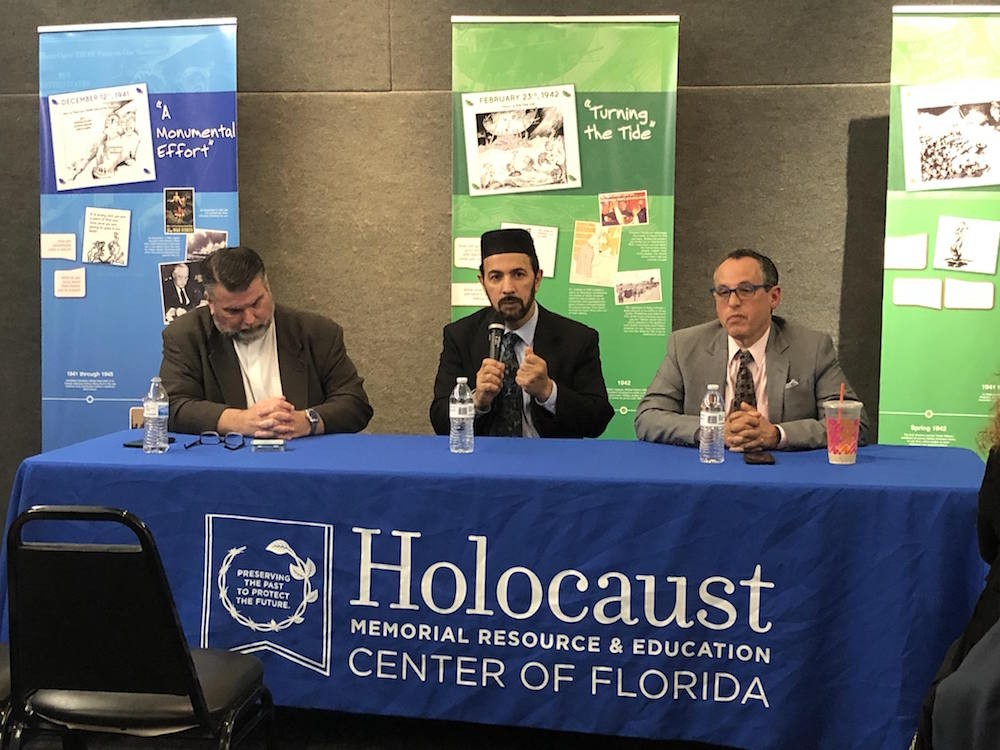As a Passover-and-Hanukkah type of agnostic Jew, I ordinarily observe Yom HaShoah – the annual remembrance for victims of the Holocaust – with about as much enthusiasm as I do the Yom Kippur fast, which is to say none whatsoever. But this year, in the wake of the deadly shooting at Chabad of Poway synagogue in San Diego, and the general resurgence of racism around the nation, it seemed high time for a reminder of what the oft-repeated phrase "never again" really means. So my invitation to participate in last week's Yom HaShoah observance at the Holocaust Memorial Resource & Education Center of Florida couldn't have come at a better time, offering a ray of hope amid these terrifying times in the form of artwork from the next generation.
On May 2, I joined Yom HaShoah committee co-chairs Sheryl Sacharoff and Toni Turocy, along with a half-dozen fellow judges, to evaluate entries in the 2019 Yom HaShoah Creative Arts Contest at the Holocaust Memorial's Maitland campus. I'd participated in the contest several years ago, but was unable to attend the last installment. I was delighted to discover that the entries, which were submitted by students from secular and parochial schools across Central Florida, appeared to have increased in quantity and quality in my absence.
This year's contest criteria called for a broad remembrance theme, with students encouraged to create art to "express their own personal reflections upon learning about the Holocaust," without mandating a specific theme or topic. More than 100 middle school students wrote poems, as did over 60 high-schoolers, with several dozen more penning creative writing essays. Many of the poetry submissions were acrostics (in which the first letters of each line form a word) or found poetry, assembled solely from words in a pre-existing text. The most striking poem took a Holocaust survivor's testimony and redacted it like the Mueller report, reducing the tragic tale to fragmented phrases isolated by brutal black bars.
I focused on the essays, the majority of which took the form of first-person narratives in which these American tweens and teens adopted the perspective of the persecuted. As you can imagine, some of their well-intentioned efforts were awkward, or even borderline offensive; despite the instruction to "refrain from graphic descriptions or portrayals of Nazi brutality out of respect for the dignity of the victims of the Holocaust," a shocking number of students (largely middle school boys, natch) ended their stories with gory details of their violent demise. Others made me laugh in spite of the serious subject, such as the handwritten diary – pages painstakingly singed to simulate aging – ascribed to Oskar Schindler, who signed off every entry with perky pearls like "OK, bye bye!" and "Oh no, the Russians are coming, gotta run!"
But there was also plenty of writing that impressed me with its craft, imagination, maturity and most importantly, empathy. The first-place middle school essay prize, which will be presented at a ceremony later this month along with the other awards, went to a shattering piece about the liquidation of the ghettos that concluded with the haunting phrase "We were slaves to life, and roommates with death." Despite being born decades after the horrors of World War II into a society suffering from digital disconnection, these students showed that they can still put themselves in another person's shoes, which is the first step toward stopping hate.
After the judging and a quick pasta dinner at Antonio's around the corner, I returned to the museum for a lively panel discussion featuring my wife's favorite WMFE radio stars, The Three Wise Guys. Imam Muhammad Musri of the Islamic Society of Central Florida, Rabbi Steve Engel from the Congregation of Reform Judaism, and Rev. Bryan Fulwider of the Interfaith Council of Central Florida led an interfaith conversation about confronting the kind of religious and ethnic antagonism that's now being openly expressed, after decades of being confined to dark corners. None could offer any simple solutions, beyond (as the Imam put it), "Good people have to stand up, work together, and push back [to] put that genie back in the bottle, and not let these people destroy our world."
Part of that effort includes supporting places like the Holocaust Memorial, which, as the Rabbi said, carries "not just a Jewish message, but a universal message." Like the Orlando Philharmonic [see Culture 2 Go, page 19], the center recently received a $10 million grant from Orange County's Tourism Development Tax fund, which will go toward building the new Holocaust Museum for Hope & Humanity on the downtown site of the former Greater Orlando Chamber of Commerce. The City of Orlando, which owns the land and building, will lease it to the museum for $1 per year. The project, which also has $10 million pledged by private donors, is expected to open in 2023, and I plan on judging future Yom HaShoah arts contests there ... until (G-d willing) such remembrances are no longer necessary.


